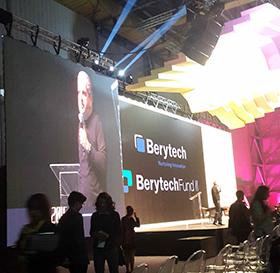Investments announced at Lebanon's BDL Accelerate

[Editor’s note: This article has been updated to include Berytech’s further investments announced on the second day.]
[Editor's note: This article has been updated in September 2016 to reflect the corrected amount invested in Loop.]
The first day of 2015’s BDL Accelerate saw nearly $13 million assigned to Lebanese startups.
For a moment it was a lackluster crowd sitting in the chilly and vast hall at the Forum de Beyrouth on Thursday afternoon but then Berytech’s CEO and chairman got on the stage shouting that everyone should snap out of their post lunch doziness. He had an announcement to make.
The Lebanon-based Berytech Fund II has invested millions of dollars over the last few months, and on the first day of 2015's BDL Accelerate in Beirut, Maroun Chammas announced the first six. Totalling just under $13 million they have covered the sectors of telecoms, health, fitness and transport.

“We need to have a mix between the sectors, and they are all extremely exciting,” he told Wamda. “Each entrepreneur is bringing something different.”
They are listed here:
$4 million in Instabeat
$1.3 million in Loop
$900,000 in Slighter
$1.5 million in Scriptr
$2 million in CCC
$2 million in Mobinets
All the investments were made in the last few months, and the remaining five will be announced on Friday. The total sum is just a little south of $20 million.

announcement. (Images via Lucy Knight)
Also, all of the startups on their list have the ability to go beyond Lebanon.
Indeed, Loop, a startup from Vancouver run by Anwar Sukkarié, will be operating on the concept of ‘shared economy’ to provide electric scooters for Beirut.
At the same time he’s going to be launching in Vancouver, London and possibly Palo Alto.
“We will have our first deployment in March 2016,” said founder and CEO Sukkarié. “You’ll see scooters in Beirut.”
Sukkarié told Wamda that his investment of $2.5 million will be dedicated solely to the Lebanese market, where he’ll be using Lebanese engineers to develop their IP.
Slighter founder Samer El Gharib told Wamda that his funding will be going towards R&D. Testing on users in Lebanon and the UK (they are part of the UK Lebanon Tech Hub’s first round of startups).

The internet entrepreneur and managing partner of i/o Ventures Paul Bragiel was blunt in his thoughts on how entrepreneurs in all countries are the same.
“It’s always a cultural issue as to why there are not more entrepreneurs, [like] family pressure […] and you’re not the only country,” he said in a conversation with the day’s host Paul Papadimitriou. “[You] all have the problems, everyone’s going through the same things.”

Ieva Upeniece, with Infogr.am, was in agreement.
“We’re also a very young ecosystem,” she said. “In the last 10 years things are really emerging, those who have done something in the last 5 years are helping the younger ones, but it’s not 20 years experience.”
Still a way to go
Although the cash that started to flow into Lebanon’s startup ecosystem over the last few years is undeniably welcome, Lebanon’s entrepreneurs face fundamental challenges externally and internally.
“The standard venture capital job generally is to identify promising companies, give them cash and help them along,” said Henri Asseily of Beirut-based growth stage venture capital firm Leap Ventures in a workshop on pitching to VCs.
The entrepreneurial ecosystem in Lebanon is weak, he said, and very few startups have experienced operational teams.
“Often the company won’t have a CFO,” Asseily continued. “They don’t know how to invest their money internally.Fadi Daou, president and CEO of Lebanon-based Multilane, a provider of high speed test equipment, said revenues have been doubling year on year. Still, operating out of Lebanon has been difficult due to government red tape, customs, and other issues in bringing hardware products to market. So the company designs and qualifies its products in Lebanon, and produces and ships from China and Taiwan.
“[Lebanon’s] policies and economy are based on consumption,” Daou said. “Our industry segment is very challenging to grow.”
Fortunately for Lebanon-based hardware startups, the situation is not totally bleak.

“Any sector that can leverage human capital in Lebanon can succeed,” Daou continued. “But obstacles [customs, redtape] need to be mitigated.”
Jamil Corbani, CEO of vertical hydroponics startup Green Studios believes that Lebanese hardware startups in emerging industries and niche markets can succeed.
If they wish to scale, however, they’ll have to go abroad.
“To do the testing, invent the processes and machines here is fine, but if you want to scale, you can’t do it in Lebanon,” he said.
The audience applauded when Corbani said he plans to only manufacture his product in Lebanon because he doesn’t want to give away proprietary technology.
As the second day started, Nicolas Sehnaoui, chairman of the UK Lebanon Tech Hub, addressed a panel asking how to address the building of an ecosystem, with Bader’s Robert Fadal, Berytech’s Maroun Chammas, and Beirut Digital District’s Mohamad Rabah.
Berytech's second announcement which came on day two totalled just under $9 million, they are listed here:
$2 million in Cinemoz
$500,000 in Adapter
$570,000 in Atbaki
$500,000 in Appdater / Mobilonia
$2 million in Ounousa
$2 million in Et3arraf
$300,000 in YallaPlay


